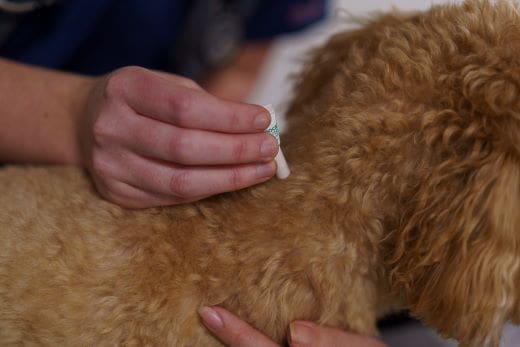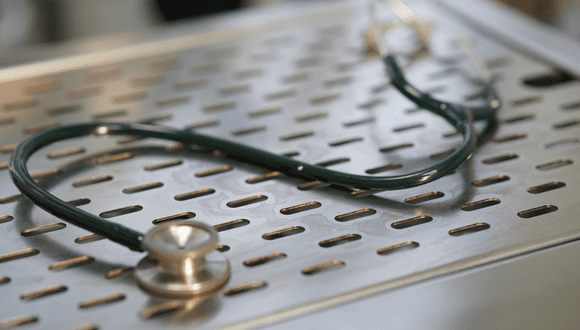
Parasite Prevention for Your Pets
Managing parasites is a key part of good preventative healthcare for dogs and cats. Our Pet Wellness Plans make this straightforward and affordable.
All of our recommended products are prescription-only, which means that an annual health and weight check is required. Please give 48hrs notice for us to dispense your pets correct medication when not coming in for a prescription check.
Parasite products should not be shared between pets; these products are prescribed based on weight and species and may therefore harm pets if given incorrectly.
Dogs
Lungworm is a potentially fatal parasite that is spread from foxes to dogs via slugs and snails. All dogs are at risk in this area and should have a monthly preventative treatment. We have several suitable products available but it is important to note that there is no non-prescription treatment that is effective against lungworm. It is especially important for lungworm treatment to be up to date prior to any surgical procedure.
In addition, we recommend routine treatment of dogs for fleas, roundworms and tapeworm. Tick prevention is also advisable if the dog is exercised in areas where there are likely to be sheep and deer. Please ask one of the team for advice on the most appropriate product for your dog. Keep reading below to learn about the signs of parasites to look for.
Cats
Cats who go outside are at risk of picking up fleas, roundworms, tapeworm and ticks, especially if they enjoy hunting. We recommend a monthly spot on treatment and now have one available that covers all parasites, meaning that no tablets are required.
Indoor cats usually need less frequent treatment, but can still be at risk of acquiring fleas. Please ask for advice on the best product for your cat. To help you recognise the signs of parasites, take a look at our information below.
Rabbits & Guinea Pigs
Rabbits can be affected by common cat and dog fleas too, which is why it’s important to routinely treat cats and dogs.
Rabbits and guinea pigs are at risk of flystrike, especially in warmer months. Flystrike typically occurs when flies (mainly bluebottle and greenbottle flies) are attracted to faeces and urine-soiled bedding and fur and lay eggs there. When the maggots hatch they burrow into the rabbit’s skin. Flystrike is often fatal so prevention is vital.
You can help to prevent flystrike by:
- Keeping your pet’s housing hygienically clean and dry
- Removing waste often
- Wrapping the hutch in an insect net
- Ensuring your pet is cleaning themselves properly – urine stains and faeces on the fur may need veterinary attention
- Regularly checking your pet and their housing is free from flies and maggots
If you have any concerns, call us immediately on 01732 868680
Signs your pet has a parasite
Fleas
Fleas are small insects (around 0.1 to 0.32cm long and black/brown in colour) that feed off the blood of mammals. They multiply rapidly and once you have a flea infestation in your home, they can be difficult to get rid of.
Signs your pet has fleas include:
- You can see them moving and jumping on your pet’s skin (or yours)
- Excessive itching & scratching
- Chewing at themselves
- Hair loss and red/irritated skin (from scratching & chewing)
- You can spot flea dirt (dark specks of flea faeces) on your pet’s skin – they will turn a reddish colour once wet
If you can’t see any visible signs but your pet is scratching more than normal, they may indeed have fleas. However, excessive scratching can also be a sign of other health issues so it’s important to get them checked over by one of our team if you are concerned.
Worms
One symptom that all types of parasitic worms can cause is unexplained weight loss. Other signs include:
- Lungworm: Difficulty breathing, coughing up blood, lethargy, unexplained bruising and bleeding, seizures, collapse, shock, blindness – can be fatal.
- Tapeworms: ‘Scooting’ their bottom on the floor, individual segments of these flat worms (look like grains of rice) in faeces or on the anus.
- Roundworms: Rice or spaghetti-like worms in faeces, vomiting, diarrhoea, swollen and painful belly, weakness, dull coat.
Worming your pet is always advised to avoid health issues in them and in you as some worms can be harmful to humans too. Regular worming for your pets is essential and can be done alongside flea treatments.
Ticks
Ticks are small and round with eight legs. They sink their mouthparts into the skin to gorge on blood and can swell up to the size of a coffee bean after a feed.
Signs your pet has been bitten by a tick include:
- You can feel a small bump on the skin – check your pet after they’ve been outdoors and after dog walks.
- Skin irritation – your pet may scratch, bite or chew where the tick is.
Ticks can be harmful if they are not dealt with straight away as they can transmit Lyme disease – a condition that can affect animals and humans.
It is not advisable to pull a tick straight out (as the head can become detached and remain in your pet’s skin) or try to suffocate or burn them. You will need a tick removal tool to grip, twist, and pull them out safely – ask our team about these.
Contact us for advice on parasites







